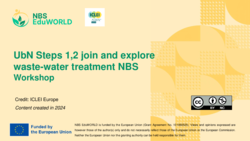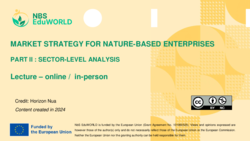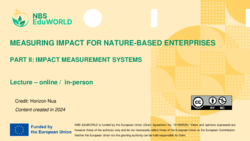
Learning Units
The NBS EduWORLD Learning Units page offers a comprehensive and flexible suite of resources designed to integrate Nature-Based Solutions (NBS) into higher education and professional training. With 50 curated Learning Units, this platform supports educators, students, and practitioners at all levels—undergraduate (UG), postgraduate (PG), doctoral (PhD), vocational, and entrepreneurial.
Covering a broad spectrum of themes and contexts, the Learning Units are structured around key educational streams:
- Common Core Units introduce foundational NBS concepts, such as ecosystem services, biodiversity, and the SDGs.
- 3rd Level Units target university-level learners, with a focus on implementation, policy, social inclusion, and future urban development.
- Entrepreneurial Units support learners exploring nature-based enterprises, business models, green finance, and sector-specific NBS opportunities.
- Vocational Units are tailored for practical skills development, project management, policy engagement, and multi-level governance.
- Case Studies and Workshops offer real-world applications and participatory methods from NBS EduWORLD demonstrator sites across Europe.
Each unit is aligned with European Qualification Framework (EQF) levels, ranging from Level 6 to Level 8, ensuring academic relevance and adaptability.
These Learning Units are editable and adaptable, supporting custom integration into curricula, practice-oriented, blending theory with applied learning, and geographically diverse, reflecting urban, rural, and coastal NBS contexts.
Download the full list of Learning Units
Whether you're a lecturer seeking ready-to-use teaching materials, a student exploring sustainability, or a professional upskilling in green innovation, the NBS EduWORLD Learning Units offer a unique, user-friendly gateway into nature-based thinking and action.
Search results ( 6 - 10 of 18 )
Introducing UbN for learning on wastewater treatment NBS
Join and explore the topic of NBS for wastewater treatment and its benefits for a more sustainable wastewater management, including wastewater treatment and reuse at the source, as well as increased greening and biodiversity, and engage in a multi-stakeholder discussion for identifying common regulatory, governamental and financial barriers and ways to overcome them for the mainstreaming of cross-collaborative frameworks and co-design of these solutions in the learners individual settings.
Find here the editable version and the teaching note.
Educational Level: Professional
Language: English
Organisation: ICLEI

Market Strategy for Nature-based Enterprise - Part I
Strategy is core to business planning and market development. In part 1 of this lesson, the nature based enterprise is guided through well-established strategic management tools (PESTLE, SWOT, TOWS Matrix) that are used to evaluate the market and analyse the internal and external environment so that strategic recommendations can be formulated and implemented. Participants will reflect and analyse on their strengths, weaknesses, opportunities and threats to evaluate the impact of market trends on their enterprise and to arrive at their own strategic recommendations.
Find here the editable version and the teaching note.
Educational Level: Professional
Language: English
Organisation: Horizon Nua

Market Strategy for Nature-based Enterprise - Part II
Strategy is core to business planning and market development. In part 2 of this lesson, the nature based enterprise is guided through a well-established strategic management tool (Porter's Five Forces). This tool is adapted to the NbE form of business to enable the learner to understand the competitive forces and power dynamics at play across their sector. Participants will reflect and analyse on their sectors to evaluate the impact of these forces on their enterprise and to arrive at their own actions to offset sector-level threats.
Find here the editable version and the teaching note.
Educational Level: Professional
Language: English
Organisation: Horizon Nua

Measuring Impact for Nature-based Enterprise - Part I
Measuring impact is important for all businesses in order to secure customers, financing and investment and to measure progress towards the companies mission and objectives. Nature-based enterprises identify measuring impact as a key priority but also a significant challenge. In this lesson, we explore the terminology around measuring impact, potential impact indicators, strategies and tools to measure impact. Participants will reflect and apply the learning to develop an impact measurement strategy for their own business.
Find here the editable version and the teaching note.
Educational Level: Professional
Language: English
Organisation: Horizon Nua

Measuring Impact for Nature-based Enterprise - Part II
In recent years, company requirements to report on nature have changed significantly. In this lesson we provide an overview of the landscape for reporting on nature and biodiversity, review the relevance of CSRD requirements for nature-based enterprise and explore relevant guidance support and tools available including TNFD LEAP frameworks and the ACT-D approach.
Find here the editable version and the teaching note.
Educational Level: Professional
Language: English
Organisation: Horizon Nua


Funded by the European Union. Views and opinions expressed are however those of the author(s) only and do not necessarily reflect those of the European Union or the European Commission. Neither the European Union nor the granting authority can be held responsible for them.